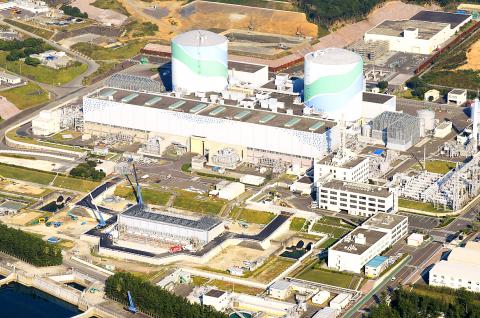Japan yesterday cleared the way for a resumption of nuclear power, four years after the world’s worst nuclear disaster in two-and-a-half decades led to the shutdown of all the country’s reactors and fueled public opposition to the industry.
Regulators said Kyushu Electric Power Co’s two-reactor Sendai nuclear plant had cleared safety hurdles introduced after a huge earthquake and tsunami triggered meltdowns and explosions at the Fukushima Dai-ichi plant in March 2011.
The Sendai plant still needs to go through operational checks before a restart, but these are expected to be completed without major hitches.

Photo: AP
The plume of radiation caused by the Fukushima disaster forced about 160,000 people from their homes, many of them never to return, in the worst nuclear disaster since Chernobyl in 1986.
The resulting closure of Japan’s reactors caused tens of billions of dollars in losses at utilities as they resorted to importing fossil fuels for power generation and paid for upgrades to meet tightened safety rules.
Some utilities decided to scrap older plants, leaving Japan with 43 operable reactors compared with 54 before the disaster.
The resumption of nuclear power is likely to be unpopular with the public after the catastrophe highlighted cosy links between utilities and the previous regulator.
The fumbled response to the meltdowns at Fukushima Dai-ichi added to the perception that nuclear power was too dangerous for such an earthquake-prone country as Japan.
Most public opinion polls have put opposition to restarts at about two-to-one, despite an average 20 percent rise in household electricity bills to cover the cost of imported fuel.
Japanese Nuclear Regulation Authority commissioners said in a televised meeting yesterday that the Sendai reactors had cleared final safety assessments. The restart has also received the approval of local authorities.
A local court last month rejected a legal bid to block the start-up by residents concerned about the plant’s vulnerability to nearby volcanoes. The residents have appealed against the decision.
Kyushu Electric hopes to restart the Sendai No. 1 reactor in late July, followed by the No. 2 reactor in late September.
The company, which reported a fourth year of losses for the 12 months through March, is desperate to restart the reactors to cut costs.
The approval came nearly two years after Kyushu Electric submitted an application for the screening. The Sendai plant won safety approval in September last year for its reactors and equipment, and was expected to be the first to restart.
Additional reporting by AP

NATIONAL SECURITY THREAT: An official said that Guan Guan’s comments had gone beyond the threshold of free speech, as she advocated for the destruction of the ROC China-born media influencer Guan Guan’s (關關) residency permit has been revoked for repeatedly posting pro-China content that threatens national security, the National Immigration Agency said yesterday. Guan Guan has said many controversial things in her videos posted to Douyin (抖音), including “the red flag will soon be painted all over Taiwan” and “Taiwan is an inseparable part of China,” while expressing hope for expedited “reunification.” The agency received multiple reports alleging that Guan Guan had advocated for armed reunification last year. After investigating, the agency last month issued a notice requiring her to appear and account for her actions. Guan Guan appeared as required,

Japan and the Philippines yesterday signed a defense pact that would allow the tax-free provision of ammunition, fuel, food and other necessities when their forces stage joint training to boost deterrence against China’s growing aggression in the region and to bolster their preparation for natural disasters. Japan has faced increasing political, trade and security tensions with China, which was angered by Japanese Prime Minister Sanae Takaichi’s remark that a Chinese attack on Taiwan would be a survival-threatening situation for Japan, triggering a military response. Japan and the Philippines have also had separate territorial conflicts with Beijing in the East and South China

A strong cold air mass is expected to arrive tonight, bringing a change in weather and a drop in temperature, the Central Weather Administration (CWA) said. The coldest time would be early on Thursday morning, with temperatures in some areas dipping as low as 8°C, it said. Daytime highs yesterday were 22°C to 24°C in northern and eastern Taiwan, and about 25°C to 28°C in the central and southern regions, it said. However, nighttime lows would dip to about 15°C to 16°C in central and northern Taiwan as well as the northeast, and 17°C to 19°C elsewhere, it said. Tropical Storm Nokaen, currently

PAPERS, PLEASE: The gang exploited the high value of the passports, selling them at inflated prices to Chinese buyers, who would treat them as ‘invisibility cloaks’ The Yilan District Court has handed four members of a syndicate prison terms ranging from one year and two months to two years and two months for their involvement in a scheme to purchase Taiwanese passports and resell them abroad at a massive markup. A Chinese human smuggling syndicate purchased Taiwanese passports through local criminal networks, exploiting the passports’ visa-free travel privileges to turn a profit of more than 20 times the original price, the court said. Such criminal organizations enable people to impersonate Taiwanese when entering and exiting Taiwan and other countries, undermining social order and the credibility of the nation’s